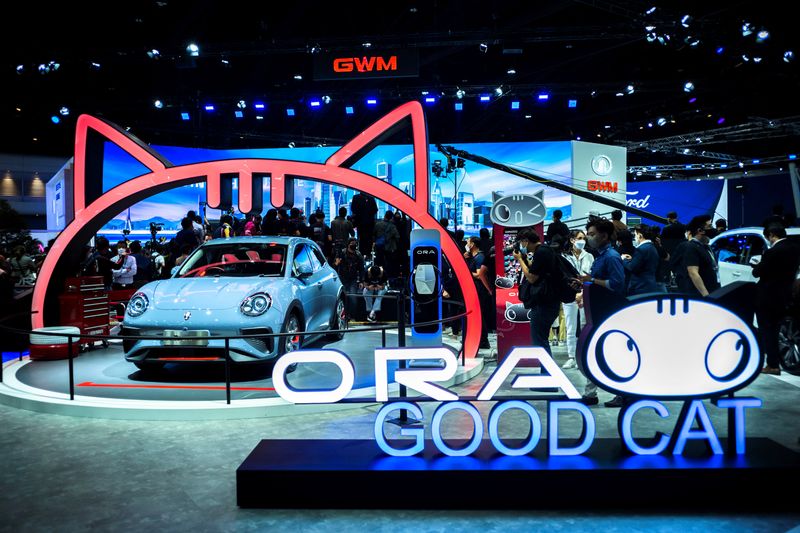(Reuters) - Chinese electric vehicle manufacturers are pouring into Thailand, having committed to invest $1.44 billion in production facilities in Southeast Asia's biggest automaking hub that has long been dominated by Japanese companies.
This new wave of investment has been backed by Thailand's government, which has rolled out incentives and courted Chinese firms, with a target to convert about 30% of the country's annual vehicle production into EVs by 2030.
INVESTMENTS UNDERWAY
China's Great Wall Motor made an early punt on Thailand in 2020 when it acquired a factory from General Motors (NYSE:GM) , where it will spend 22.6 billion baht ($647.38 million) turning it into a regional production centre for EV and hybrid cars.
The automaker will start producing its popular compact Ora Good Cat EV in Thailand next year, and is also bringing in its subsidiaries MIND Electronics, HYCET and Nobo Auto that make electronics, powertrains and seating.
Chinese rival SAIC Motor, which owns MG Motor and has a partnership with Thai conglomerate Charoen Pokphand Group, launched its first EV in the country in 2019.
It is investing 500 million baht to expand its existing plant for EV parts and battery manufacturing, the company said in April.
Chinese EV giant BYD is investing 17.9 billion baht to set up a new facility in Thailand that will start producing 150,000 passenger cars per year from 2024, some of which will be exported to Southeast Asia and Europe.
China's Hozon New Energy Automobile is also working with Thailand's Bangchan General Assembly to locally produce the electric NETA V model starting next year.
IN THE PIPELINE
Several deals are also in the pipeline, according to the Thailand Board of Investment (BOI), which has been pursuing Chinese automakers.
State-owned Chongqing Changan Automobile, which has partnerships with Ford and Mazda, will invest 9.8 billion baht to set up its first right-hand drive EV factory outside China, according to the BOI.
GAC Aion, a subsidiary of state-owned automaker Guangzhou Automobile Group (GAC) is planning to invest more than 6.4 billion baht to produce EVs in Thailand, the BOI said.
China's Chery Automobile, which first rolled out a self-developed EV in 2009, is "very interested" to invest in Thailand and plans to enter the market early next year, according to the BOI.
Chongqing Changan, GAC and Chery did not respond to requests for comment on their plans for Thailand.
Chinese automaker Geely is also in the early stages of planning an entry into Thailand, Reuters reported in May, including weighing models for import and local manufacturing.
RISING POPULARITY
The influx of Chinese models appears to be helping to boost the popularity of EVs in Thailand, the second-largest car market in Southeast Asia.
In the first half of 2023, over 31,000 EVs were registered in Thailand, more than three times the number for all of 2022, the BOI said, citing industry data.
The price gap between EVs and combustion engine cars has also narrowed, in part because of government subsidies.
The cheapest variant of Great Wall's Ora Good Cat - Thailand's best-selling EV last year - currently costs around 828,500 baht, while Hozon's NETA V is priced at 549,000 baht, according to company websites.

On Toyota's Thailand website, the Corolla Altis is priced at 894,000 baht and the Yaris Ativ at 549,000 baht.
($1 = 34.9100 baht)